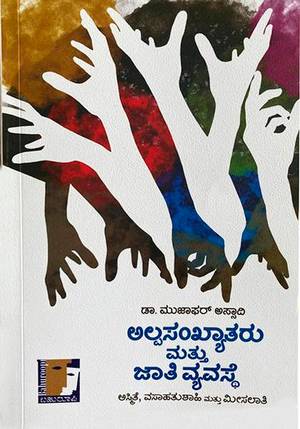Shirva (Udupi District) / Mysuru, KARNATAKA :
Muzaffar Assadi’s book examines the ways in which the social space was documented during colonial times

Muzaffar Assadi, professor of political science in the University of Mysore, has brought out a new book on caste among Muslims, a relatively unexplored area.
In the book Alpasankyakaru Mattu Jati Vyavaste: Asmite, Vasahatushahi Mattu Meesalati (Minorities and Caste System: Identity, Colonialism and Reservation), the author argues that Islam, one of the semitic religions known for its established rules and framework, is now tested against the remnants of caste practices.
Multiple factors
The book, which runs into 264 pages and is published by Bengaluru-based Bahuroopi, explores practices of caste that are not just the result of conversion but inherent in the logic of trade, the class interest of retaining property, social mobility from Central Asia, social identity, and political expansionism.
The author says that colonialism, while documenting various castes, did make a distinction between Hindu social order and Muslim social order. In the latter case, social space for internal mobility, spaces for enlisting as ‘Ashrafs’ (Sheikh, Sayyed), and for continuing traditional occupation was available. And social hierarchy and social distancing continued to perpetuate.
Noting that colonialism created new castes, Prof. Assadi pointed out that the larger agenda of documenting, enlisting caste was ultimately meant to hegemonise, control, and dominate. The book focuses significantly on the way Muslims became subaltern classes during the colonial rule.
“With the experience derived from colonial encounters, Indian Muslims were castigated and condemned again and again for their social backwardness. This was backed by enlisting hundreds of castes among Muslims, although enlisting remained incomplete,” the author argues.
Post-Independence
The legacy continued after the Independence with reports on backward classes/ethnographic studies identifying and enlisting social groups, known for practising caste. “This culminated in identity politics, demand for affirmative action and reservation policy,” Prof. Assadi notes.
The author painstakingly unearths issues of caste among Muslims by referring to material from history, including the colonial census reports, gazetteer, travelogues, missionary works, police records and writings of Muslim scholars. The book comes at a time when there is a demand to re-enumerate castes and a growing urge for enhanced reservation.
source: http://www.thehindu.com / The Hindu / Home> News> States> Karnataka / by Naghesh Prabhu / Bengaluru – November 28th, 2021








